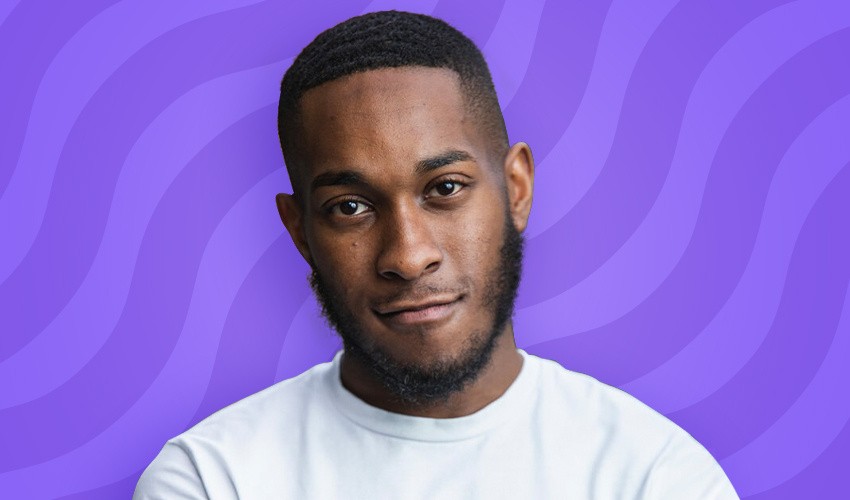Sometimes, talking about your feelings can be deeply uncomfortable. And there’s no instruction manual to tell you how to do it. Especially in the bedroom.
From performance anxiety to body issues, our research finds that modern men have plenty of worries about sex. But they don’t know how to talk about it – and there aren’t many good examples to follow.
“So often, the information we’re given is about trending topics or generalised advice, not the real thoughts, feelings and fears being voiced by real men,” says Dr. Anand Patel, a GP specialising in men’s health. He’s one of the experts we spoke to about The Menifesto – our campaign to celebrate male role models.
Curious to know real men’s thoughts on sex and masculinity? Read on for more insights from our survey and to meet the incredible men behind The Menifesto. You’ll also find tips on sexual confidence and communication from men’s dating coach, Jacob Lucas.
In the UK, our conversations about sex are often surface-level – and most of the time they’re dominated by jokes and banter (according to 53% of those surveyed), rather than anything meaningful.
“Humour is often a safety net as it’s less risky than opening up about real fears or insecurities,” says Dr. Anand Patel. “Joking about sex keeps it light, but sometimes at the cost of honesty.”
For men, sexual performance is one of the most common bedroom concerns (40%) but many still avoid honest conversations.
In fact, 10% of men say they want to talk more openly about sex with their partner, but don’t. That’s equivalent to over 2.25 million male adults in the UK. “Men want connection, but many are still struggling with the tools to have it,” says Dr. Patel.
That's why The Menifesto exists – to celebrate male role models and show men what healthy, grounded conversations about sex and masculinity can look like in real life.
When we met Gideon, Kian, Gil, and Kieth, one thing was for sure: these men aren’t afraid of communication. Each one comes from a different generation – from Gen Z to Boomer – but navigates his relationships with similar openness, honesty, and strength.
Gideon, Gen Z

“From an early age, I just felt this spark within me,” Gideon remembers. “I grew up obsessed with crystals and mermaids. It spoke to something in me.”
Gideon is a 27-year-old actor and part-time witch living in Liverpool. He blends mysticism, kink, and a no-BS approach to dating.
Despite his openness around kink and communication, Gideon is single and, frankly, unimpressed.
"People tend to over-promise and under-deliver in bed,” he says. “I think it’s because communication just isn’t there.”
He could be right. Only 27% of our gay and lesbian survey respondents say they talk to their partner about sex all the time. 43% say they joke about sex with their partner and its mostly banter.
But Gideon doesn’t shy away from real talk in the bedroom. “If someone’s performance isn’t great, I’ll say so. I don’t do it to be rude; I just want people to improve. Some say it’s harsh, but what’s the alternative? Staying silent and being unsatisfied?”
He’s over dishonesty in the dating scene, especially straight-acting men using him as their experiment. “I become their secret, a way to explore without being seen,” he says. “That secrecy is isolating and emotionally draining."
So why aren’t more people honest about sex, like Gideon? Dr Anand Patel says, “Most people don’t really know their bodies or their preferences, because they’re acting out what they think they should be doing, rather than what they actually enjoy.”
To improve honesty around intimacy, Dr Patel. recommends getting to know your body, exploring your desires, and being curious about your partner’s preferences, too.
Meanwhile, Gideon prefers to wait rather than having sex with someone right away. “In the gay community, there’s often pressure for immediate gratification. But I think a little waiting creates trust. It helps me feel emotionally and physically safe.”
Kian, Millennial

“I dress well and I get attention,” says Kian. “But I’m very introverted. I’m not the guy who walks up to women in bars with cheesy lines. I just like a real conversation – if it flows, it flows.”
Meet Kian, 29, from Birmingham. He’s straight, single and tired of being misunderstood. Truthfully, it’s easy to get the wrong idea about him. Kian hits the gym 4–5 a week and is body confident. But he knows confidence doesn’t come easy.
“I’ve met women who are confident about their bodies, and others who are body shy and want to keep their top on during sex,” he says. “I don’t judge. I’ll always tell them they’re attractive – inside and out. I want them to feel good.”
Kian may be reserved but, when it comes to intimacy, he's not shy about communication. In fact, for him, it’s non-negotiable. “I question everything before we have sex,” he says. “I don’t want things to get awkward in the moment. I’ll ask what she likes, what she doesn’t.”
It’s this approach that makes Kian a good role model for casual sex. “Casual doesn’t mean careless,” explains Dr. Patel. “When handled well, these connections are positive and fun for everyone involved.”
For Kian, this directness has become second nature. “It’s just a normal conversation now. Most women are happy I’ve asked [about what they enjoy during sex]. They open up too. It’s about consent and making sure we’re both on the same page.”
But there are exceptions. Kian says men can feel wary about telling women how many sexual partners they’ve had: “If the number’s too low, they think you’re inexperienced. If it’s too high, they think you’ve been around. Either way, you can’t win.”
Luckily, he’s not one to be pushed around by other people’s expectations. He prefers to keep it real and respectful: “I’ll always be honest about how I feel. I won’t let someone guess – but I also won’t force myself to be someone I’m not.”
Gil, Gen X

“I’ve always been an open book,” says Gil. “I think when you’re honest about sex, ageing, and insecurities, it helps others feel they can be too.”
46-year-old Gil is sexually active, happily single, and refreshingly open about everything from erectile dysfunction to his experiences accidentally visiting a Dutch brothel!
“I’m less active than I used to be - and that’s okay,” he shrugs. “Sometimes I rely on the little blue pill. Brewer’s droop is real, especially after a few drinks. That’s part of ageing. It doesn’t bother me.”
His confidence is refreshing – and rare among his generation. 36% of Gen X men we surveyed say one of their biggest worries about sex is performance issues. The younger generations seem more worried about body insecurities (28% of Gen Z men, compared to 19% of Gen X).
That’s something Gil sees play out in gay bars. “There’s this ‘Mean Girls’ energy now,” he says. “Especially in a pretty but pretentious gaybourhood - hot guys who know they’re hot. You walk in and they scan you up and down like you don’t belong.”
Gil is troubled by the exclusion some men now experience in gay spaces – whether that's by fellow gays who don't think you look the part or straight people co-opting events like Pride as an excuse to party.
He's passionate about remembering the history behind Pride – which started as a protest for gay rights – and improve education around issues like HIV. “I want people to understand that ‘undetectable’ means untransmittable,” says Gil (who's negative).
When HIV is undetectable, that means you can’t sexually transmit the virus to a partner. Knowing this can help gay men feel less fear and shame around their sexuality.
"Many people still think HIV only affects certain groups or is a 'death sentence'," explains Dr. Patel. "That legacy can still block people from intimacy, testing, or seeking care. Today, so much support is out there." For anyone affected by HIV, he recommends seeking out inclusive sexual health clinics or peer networks that understand your experience.
Despite the issues facing the modern LGBTQ+ scene, Gil praises the younger generations for their emotional maturity. "You're seeing more people identifying as demisexual – needing an emotional connection before sex,” he says. “That wasn’t a thing in my day.”
Keith, Boomer

“You don’t stop having sex at 70 – but you do have to talk about it more,” says Keith.
Keith is a 70-year-old part-time actor and retired teacher. Married for 25 years, he credits his long-lasting relationship to one thing – communication. Even when it’s uncomfortable.
“You’ve got to talk. Talk when it’s not right. Talk when it is. If sex stops, it doesn’t mean the love has,” he says. Vaginal dryness and reduced erections can make sex tricky to navigate when you get older. But there are other ways to stay connected.
“Sexual intimacy doesn’t have to mean going all the way,” says Keith. “There’s still a sense of grief, sure. But there are still things you can do for each other that feel good. You adapt.”
Relationship expert, Jacob Lucas, recommends shifting the focus to mutual masturbation, oral sex, and even sex toys to keep the spark alive. There's also something to be said for regularly sharing your feelings with your partner and creating a safe space for them to do the same.
“Emotional intimacy plays a key role in keeping the connection alive,” Jacob says. “With emotional intimacy comes trust, and when you trust your partner in sex, the experience will become more pleasurable.”
While communication has kept his relationship alive, Keith knows how tough in can be for men to talk. “We’re afraid of appearing vulnerable,” he says. You don’t want people to think you’re ‘less than’.”
His experience is pretty common. Our survey found male Boomers are talking to their partners about sex the least (8%). When talking about sex to their partner, 47% joke about it. With friends, 71% said sex chat was mostly banter.
However, Keith can see the world changing for the better, particularly conversations about masculinity. He explains:
“The alpha male thing - dominant, macho - it’s not what most women actually want. Heather values romance, empathy, intelligence and a sense of humour. And those qualities are finally being appreciated in men.”
If you’re like most people in the UK, your sex ed class probably didn’t teach you much about good sex or healthy communication. Maybe you picked up ideas from porn – or just learned on the job.
Some men go online, with over 1 in 4 Gen Z and Millennial men (26%) saying they talk about sex with strangers online or in forums. Millennial men are also the most likely to talk to AI about sex (36%).
Lots of men might find this helpful, but Dr. Patel worries that the information given can be inaccurate. “It also links back to men’s reluctance to have open communication in real life, even with their partners and friends,” he says. To get more confident communicating about sex, check out the tips below.
How to feel more sexually confident
When it comes to sexual confidence, “practice makes perfect,” says men’s dating coach, Jacob Lucas. So, be open to asking your partner what they like and letting them guide you – your hands, your thrusts, how you kiss them, and so on.
Pay attention to your partner's signs of arousal – fast breathing, moans, flushed skin, gripping their hands or legs – and let this be a little confidence boost for you! You're clearly doing something right. If you're not sure, ask questions like "how does that feel?" to see what's working.
“If they give you negative feedback, don’t take it personally,” Jacob advises. “Ask what you could do better next time and try it.” Everyone has different preferences with sex, so negative feedback is necessarily a criticism of you – just a request to try things differently.
“See it as two people exploring each other’s bodies and what works for you both. The confidence will follow when you have great sex together,” says Jacob.
How to talk to your partner about sex
“To improve your communication, the most important factor is effort. Nobody is automatically amazing at communication,” says Jacob.
The first step is to find a private moment to have a conversation with your partner. If you’re worried about how they’ll react, that’s understandable! But the conversation doesn’t have to be heavy.
“A lot of worries in your mind, when let out and expressed, turn out to not be that big of a deal in reality,” says Jacob. “Having two people who listen to understand each other will create a safe space for each other in their sex lives.”
You could start just by asking what your partner has liked the most about sex with you – if there’s anything they’d like more or less of. Think of this a bit like foreplay, but no pressure. If the conversation doesn’t lead to sex right away, being more open with each other can still increase intimacy over time.
If there's something worrying you, share this with your partner using simple language that doesn't place the blame at their door. Don't say: "We don't have enough sex. Don't you fancy me anymore?". Instead, try saying: "I miss being intimate with you and I'm worried you might not be attracted to me. How do you feel about our sex life at the moment?"
How to add your voice to The Menifesto
When it comes to getting intimate – emotionally and physically – it can feel easier once we’ve seen others modelling the behaviour. That’s why we’re sharing cross-generational stories from real men.
“So often we can feel a personal experience is just that, purely personal,” says Dr. Patel. “But by being so open and speaking up about the silent pressures that shape modern masculinity, the hope is that our male voices can inspire more men to feel confident enough to do the same.”
And now we’re handing the mic to you! Want to add to The Manifesto? Get in touch to share your story and find out how you can help reshape the conversation around sex, intimacy, and masculinity.
All statistics mentioned in this article are from a Lovehoney UK survey with Cint; 2,016 nationally representative respondents, UK adults over the age of 18 (June 2025).
